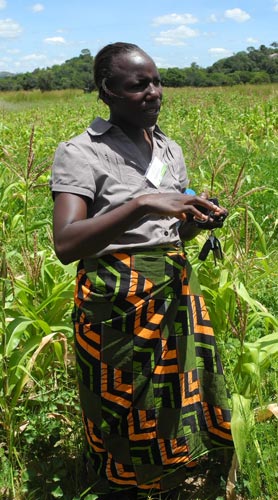
How would you describe your experience of becoming a female researcher in a traditionally male-dominated field?
Masuka: During the school year I lived with my father in a small farming town called Rusape, Zimbabwe. In December and January, I spent the holiday planting and weeding with my mom and my siblings in our village. I also helped harvesting the crops in April and May. Next to our village was a successful commercial farming community (the Mazoe district). The agriculture I observed around the two farming towns inspired me. At the same time, I hoped that by pursuing a career in agriculture I could help the communal farming communities (like where my mother farmed) which were dominated by women of all ages. Most of the men migrated (and still migrate) to urban areas for employment opportunities.
In 1996, I made up my mind to join the male-dominated field of agriculture research. It was a bold decision only because I was discouraged by the general opinion of the community that thought agricultural research was only suitable for men. As soon as I completed training in 1999, I taught agriculture in high school. It was only after some parents saw the practical application of what their children were learning in their own gardens and fields that they appreciated what the ‘lady agriculture teacher’ was capable of. When I joined a local agriculture college in 2003, the perception was different. They appreciated the presence of a woman in the team as a way of encouraging female students, to show them they could also make it in agriculture research and production. By then, the government had begun promoting women empowerment, too, and this made my experience easier.
While the presence of a female researcher is appreciated, there is still a tendency to look down upon women, assuming that certain types of work could only be done by men. Sometimes, the men I work with resist a woman’s leadership but I don’t let this discourage me. On the contrary, it gives me motivation to prove that female researchers are equally capable. I also try to maintain high personal standards in my work in order to encourage female researchers and colleagues at all levels. I owe a debt of gratitude to senior scientists who supported me – and who still support me — and who appreciate the participation of female scientists.
With the Drought Tolerant Maize for Africa (DTMA) and Improved Maize for African Soils (IMAS) projects, I have been involved in improved variety development, testing and screening, and the dissemination of low nitrogen and drought tolerant varieties. I think the field is becoming more accepting of women scientists but in some parts of the world, there is still resistance.
In many parts of Africa/the world, women farmers are key actors in agricultural production and food security. How can your work empower them?
Masuka: It’s true in most parts of Africa women stay in the villages doing most of the farming while the men seek employment in the cities. Trends are changing, but the communal farming community is still dominated by women farmers. These women do not have sufficient capital to invest in improved seed, inorganic fertilizers, and irrigation facilities. They are farming in marginal areas with pulverized soils, sandy soils, and low rainfall.
The varieties developed by CIMMYT are reaching women farmers in sub-Saharan Africa. Hopefully, with better yields, they can not only feed their families year-round but also sell their surplus crops to afford family health care and education.
What advice would you give to young girls wanting to study science?
Masuka: Science can be academically challenging but that applies to both men and women. It can be frustrating as a woman because, despite having gone through the same rigorous training, some people will think science is only for men. Men and women have the same capabilities when it comes to research. My advice for the young women who wish to become future researchers is to be passionate, determined, committed, and focused and you will make it.
The CRP MAIZE will be hosting a side event on the role of maize in Africa at the Africa Agriculture Science Week (15-20 July) on 16 July in Accra, Ghana. Join us if you can and follow the AASW Blog and #AASW6 on Twitter.
 Gender equality, youth and social inclusion
Gender equality, youth and social inclusion